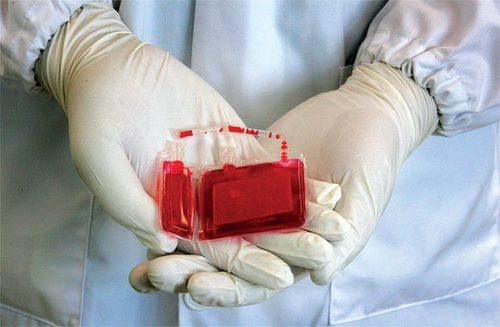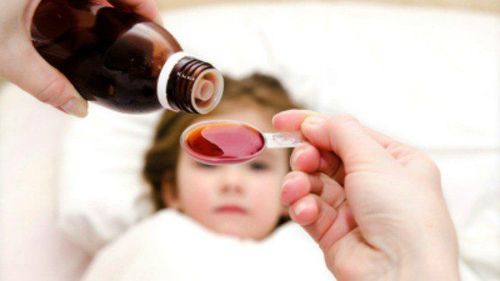This is an automatically translated article.
The article was professionally consulted by Dr. Nguyen Thai Ngoc Chau - Department of Pediatrics - Neonatology, Vinmec Phu Quoc International General Hospital. Uncle has 9 years of experience in the field of Pediatrics - Neonatology, former Deputy Head of Pediatrics Department of Phuong Chau International Hospital (Can Tho). His strength is examination and treatment of children's nutrition problems, pediatric emergency resuscitation, pediatric pathology treatment.Rubella (also known as German measles) is an infectious disease caused by the rubella virus (Rubivirus-like RNA virus of the family Togaviridae). The disease is transmitted from an infected person, a carrier of the virus to a healthy person through the respiratory tract or from mother to fetus.
Rubella is manifested by fever, rash, swollen lymph nodes. The disease usually has a benign course but can also cause some complications such as encephalitis - meningoencephalitis, thrombocytopenia bleeding...
1. What is congenital rubella?
Pregnant women infected with rubella , especially during the first 18 weeks of pregnancy, can cause miscarriage, stillbirth, premature birth and severe damage to the fetus. Cases of congenital rubella in children include:
The child was born to a mother with a history of rubella infection during pregnancy and the child had a positive rubella IgM test for rubella; Congenital rubella syndrome: With fetal malformations of 2 groups: Group A: Cataracts, congenital glaucoma, congenital heart disease, hearing damage, retinitis pigmentosa; Group B: Erythema, hepatosplenomegaly, jaundice, small brain, growth retardation, meningitis, bone disease (X-ray image).
2. How is congenital rubella diagnosed?
The definitive diagnosis of infants infected with Rubella is based on testing for antibodies in umbilical cord blood. Infection can be confirmed when both IgM-positive and IgG-positive rubella are found.

3. How is congenital rubella treated?
It is not possible to vaccinate against rubella in pregnant women. Therefore, if not vaccinated before pregnancy, the diagnosis of rubella infection in pregnant women plays a very important role.
In the case of pregnant women infected with rubella:
During the first 3 months of pregnancy: Counseling to terminate the pregnancy when there is a confirmed diagnosis. At 13 - 18 weeks of pregnancy: the risk of congenital rubella is very high. It is necessary to combine amniocentesis to confirm the diagnosis. If rubella is found in the amniotic fluid, advise on termination of pregnancy; vice versa, if the case is negative, continue monitoring. After 18 weeks of pregnancy: The risk of having a baby with congenital rubella is relatively low, but close pregnancy monitoring is still needed. In addition, pregnant women also need to be treated with symptoms such as:
Pain relief, hypothermia; Keep warm, avoid cold wind during the rash, prevent superinfection of respiratory tract; Eat enough nutrients to improve resistance; Increase the intake of fruits such as oranges, lemons and vitamins; Children with congenital rubella syndrome need to be treated for complications caused by the disease.
4. Is it dangerous for pregnant women to have Rubella?
Pregnant women with rubella are very dangerous. The most concerning are the malformations of the fetus in the womb:
first 3 months: 70-100% of babies are born with congenital rubella and 25% of children have birth defects in the organs of the heart, eyes, brain ; More than 3 months later: If the fetus is 13-16 weeks pregnant, the child has congenital rubella with the rate of 17%. When the pregnancy is 17-20 weeks, this rate is 5%. And when the pregnancy is more than 20 weeks, that rate is 0%. In particular, women infected with rubella in the first 18 weeks of pregnancy are also very susceptible to miscarriage, stillbirth or premature birth. If the pregnancy can be continued for a long time, it will also make it difficult for the child to develop healthy, often underweight, slow in growth, prone to illness and disease, and have poor intelligence.
Therefore, during pregnancy, women need to go to reliable medical facilities or reputable specialized hospitals to do all the necessary tests to ensure the safety of both mother and child.

5. How to prevent congenital rubella?
The two main measures of rubella prevention are isolation and vaccination. Vaccination with attenuated Rubella vaccine confers immunity for at least 16 years or possibly a lifetime. Therefore, it is recommended that children be vaccinated against Rubella widely from 12-24 months of age.
To prevent congenital Rubella syndrome, women of childbearing age (15-40) if they have never had the disease or have not been vaccinated when they were young, they need to receive this additional vaccine to help prevent Rubella disease and prevent other diseases. Pregnant women with the disease will cause congenital rubella syndrome to the fetus.
Note: At least 3 months after vaccination should be pregnant.
As a key area of Vinmec Health system, Pediatrics Department always brings satisfaction to customers and is highly appreciated by industry experts with:
Gathering a team of top doctors and nurses in Pediatrics : consists of leading experts with high professional qualifications (professors, associate professors, doctorates, masters), experienced, worked at major hospitals such as Bach Mai, 108.. Doctors All doctors are well-trained, professional, conscientious, knowledgeable about young psychology. In addition to domestic pediatric specialists, the Department of Pediatrics also has the participation of foreign experts (Japan, Singapore, Australia, USA) who are always pioneers in applying the latest and most effective treatment regimens. . Comprehensive services: In the field of Pediatrics, Vinmec provides a series of continuous medical examination and treatment services from Newborn to Pediatric and Vaccine,... according to international standards to help parents take care of their baby's health from birth to childhood. from birth to adulthood Specialized techniques: Vinmec has successfully deployed many specialized techniques to make the treatment of difficult diseases in Pediatrics more effective: neurosurgery - skull surgery, stem cell transplantation. blood in cancer treatment. Professional care: In addition to understanding children's psychology, Vinmec also pays special attention to the children's play space, helping them to have fun and get used to the hospital's environment, cooperate in treatment, improve the efficiency of medical treatment.
Please dial HOTLINE for more information or register for an appointment HERE. Download MyVinmec app to make appointments faster and to manage your bookings easily.














